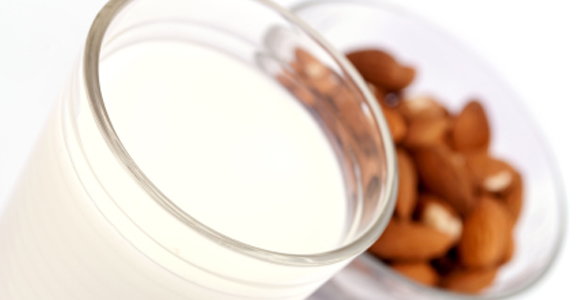Have you ever walked through the milk aisle at your local grocery store and been perplexed by all of the choices that were available? If so, you're not alone. The milk section has expanded far beyond just cow's milk. There is a plethora of "milk" options now, and one of the most popular options in recent years is almond milk.
What Is Almond Milk?
Almond milk is a plant-based alternative to traditional dairy milk. Almond milk is made by toasting and grinding almonds and then blending them with filtered water. Some vitamins and minerals are naturally-occurring within the almonds and some are added. There are no artificial colors or flavors added. All brands I've seen state they are made from responsibly-grown almonds and contain no genetically modified organisms (GMOs).
Nutrients in Almond Milk
Using Silk brand unsweetened almond milk's stats (although these stats will be quite similar among all brands), one cup contains 30 calories, 2.5 grams of fat (and that fat comes from heart-healthy monounsaturated and polyunsaturated fats), 160 mg of sodium,
When compared to traditional dairy milk, almond milk does fall short on protein (unless it's a protein-fortified version). One cup of almond milk has only 1 gram of protein compared to 8 grams in a cup of cow's milk. However, as long as you're getting protein from other sources in your diet, you should meet your daily protein needs.
What About Food Allergies?
Almond milk is a safe milk option for people with food allergies or intolerances or who have immune responses to certain food proteins. Almond milk does not contain any dairy, lactose, soy, eggs, cholesterol, gluten, MSG, or casein or whey (milk proteins). Almond milk is not safe to drink if you are allergic to almonds. Additionally, some manufacturers may use the same facilities to process products that contain coconut. Check the label of the brand you are going to purchase to ensure it isn't processed in a facility with an ingredient you can't have.
Sweetened and Flavored Varieties
Unsweetened almond milk only contains about 30 to 40 calories per cup (calorie count varies just slightly from brand to brand). However, most brands have sweetened versions of the stuff. Many brands of almond milk now offer flavored versions, including chocolate and vanilla. The flavored types of almond milk are offered in both sweetened (higher in calories) and unsweetened versions (calorie count is similar to plain, unsweetened almond milk).
Can Almond Milk Always Be Used in Place of Cow's Milk?
You can use almond milk in place of cow's milk in almost everything, including soups, baked goods, sauces, smoothies, on cereal and in your morning cup of Joe. Almond milk doesn't work well in homemade puddings or yogurt.
So, Is Almond Milk Good for You?
The bottom line is that almond milk is a heart-healthy, low-calorie, nutrient-dense beverage. However, choose unsweetened almond milk to avoid extra calories from added sugars. Also, remember that just like cow's milk, almond milk is perishable and should be used within 7-10 days after you have opened it.
Kari Hartel, RD, LD is a Registered, Licensed Dietitian and freelance writer based out of St. Louis, MO. Kari is passionate about nutrition education and the prevention of chronic disease through a healthy diet and active lifestyle. Kari holds a Bachelor of Science in Dietetics from Southeast Missouri State University and is committed to helping people lead healthy lives. She completed a yearlong dietetic internship at OSF St. Francis Medical Center in Peoria, IL, where she worked with a multitude of clients and patients with complicated diagnoses. She planned, marketed, and implemented nutrition education programs and cooking demonstrations for the general public as well as for special populations, including patients with cancer, heart disease, diabetes, Alzheimer's disease, obesity, and school-aged children.




